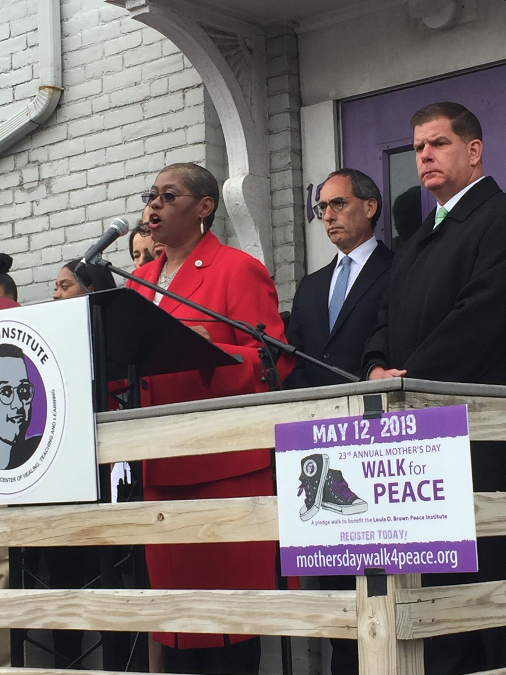May 2, 2019

Founder Tina Chery addresses the crowd Thursday morning as Mayor Walsh looks on. Dan Sheehan photo
Mayor Martin Walsh, Attorney General Maura Healey and dozens of survivors of victims of homicide gathered at the Louis D. Brown Institute in Fields Corner Thursday morning at a ceremony marking 25 years of community work by the organization.
After a stray bullet killed her 15-year-old son Louis in 1993, Dorchester resident Tina Chery founded the institute in an effort to provide resources, services, and support to families and friends that, like her, have lost loved ones to homicide. 25 years later, the institute is launching a “strategic growth plan” to bring their trauma-informed curriculum and healing resources to other parts of the country, in hopes of building what Chery described as a “national movement of waging peace.”
Support local journalism! Subscribe to the Reporter— just $30 for 52 weeks!
“[The institute] has developed our best practices curriculum and survivor-centered training used to equip individuals for the emotional, social, and financial tools to support survivors of homicide victims, starting with the death notification,” said Chery. “With tools and expertise like this in place, the city of Boston has been recognized for its innovative approach. There is no other city in the country where this level of coordinated, consistent, and compassionate response to homicide has been established.”
Speaking a day after a shooting in Jones Hill wounded three and and killed one, Chery noted that the incident made her organization’s mission “even more urgent.”
“Our entire community is once again re-traumatized,” she said.
The shooting, the fourth fatal one in Dorchester this year, lent a somber mood to the ceremony.
When asked if Boston is safer now than it was 25 years ago, Mayor Walsh responded with tempered optimism.
“I think as a city we’re safer,” he said. “But if [you] ask a parent or someone who lost a loved one, they won’t feel that way. What has changed, the difference is the work that Tina Chery and her organization are doing to help provide support and comfort to victims and survivors of violence--that didn’t really exist before.”
Chery agreed that, while endemic gun violence persists, society’s response has changed. She recounted how, the night her son was murdered, she left the hospital with no resources, no support system, and nobody to turn to. Today, literature from the LDB Peace Institute, such as survivors burial and resource guides and workbooks for grieving children, are available throughout the community.
“All of our Boston trauma hospitals have purchased this survival guide so that no family leaves the hospital empty-handed, the way I did back in 1993,” said Chery.
One of the first steps to growing the organization’s influence on a national scale is a simple one: recognizing Survivors of Homicide Victims Awareness Month, which the institute observes from November 20 through December 20 each year.
“I’m proud to see that we’re taking this message to a national level,” said Walsh. “I support the establishment of [National Homicide Survivors Awareness] month, and I encourage all mayors across America to do the same thing.”
More coverage from BNN-TV's Neighborhood Network News
Attorney General Healey reiterated to the crowd her duty to reinforce gun laws and get illegal firearms off the streets, but also emphasized the importance of Chery’s work as part of law enforcement’s work to reduce violence.
“Unless and until we address those root causes of violence in our communities, we’re [not] gonna get to where we need to be,” said Healey. “For us as a city, state and country, to end the scourge of gun violence that we’re seeing in mosques, in churches, in homes, in schoolyards, and on street corners, it’s about dealing with pain and dealing with trauma.”
Julio Sanchez, a survivor of gun violence who has himself lost several friends to gun violence, told the crowd he was “forced to look inward” as he came to terms with his PTSD as a survivor. Now, he’s involved with VIAP, a Violence Intervention Advocacy Program, and credits Chery’s organization for playing an important role in his healing process.
“I always felt safe coming to the Peace Institute,” he said. “They always listened to me. They always loved me.”
Learn more about the Peace Institute at its website. Follow Dan Sheehan on Twitter at @dsheehan1890.
Support local journalism! Subscribe to the Reporter— just $30 for 52 weeks!


